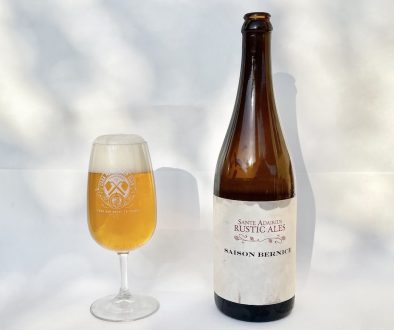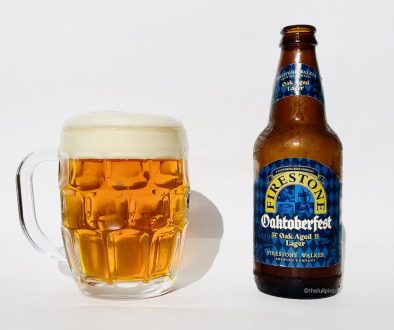Reviewed: The Lost Abbey Veritas Peach
Product Description: Today you’re holding a bottle of Veritas Peach. We’ve released some amazing stone fruit beers in the past and decided it was time to make this an annual release. Based on the success of Veritas 013 and 015, Veritas Peach bursts forth with notes of funk and farm fresh ripened fruit. Fuzzy with a pronounced juicy flesh finish, Veritas Peach promises to be a release worth looking forward to year after year. 6.5% ABV. Wild ale aged in oak barrels with peaches.

Veritas Peach is a new annual release from The Lost Abbey that is a spinoff from the brewery’s Veritas line of experimental sour ales. There have been a number of stone fruit blonde sours in the Veritas series that were big hits, so now we get to have something like this each year. It’s a big treat! For this first release, bottles were available to the public during a pre-sale in late December while those who signed up for the brewery’s reserve society, The Sinners and Saints Club (back again from a few years hiatus), received the bottle as part of their membership allocation. Well, the preliminary results are in, and I’m here to share my thoughts on this newest creation.
For those unfamiliar with the peaches used in this beer, they are sourced from Masumoto Family Farms south of Fresno, CA. This is an organic farm that specializes in peaches (six varietals), nectarines (three varietals), and grapes/raisins. Their inclusion in craft beer is nothing new thanks to the persistent and passionate advocacy on their behalf by fellow beer lover and personal friend of mine, Chris Quiroga. Possibly from that first “wow” moment many of us shared with Lost Abbey’s fabled Yellow Bus peach sour from many years ago, Chris has been on the hunt for the best local peaches and nectarines and has personally sourced them for a variety of talented breweries in the Southern California area including Modern Times, The Bruery, Monkish, Highland Park, Cellador Ales, Council, Homage, Resident, Craftsman, Phantom Carriage, and of course The Lost Abbey. In fact, Veritas 013, 015, and 018 were all brewed with Masumoto stone fruit and each was highly-acclaimed.
Popping this 750mL corked and caged bottle open, there is hefty carbonation but no gushing. The beer is murky, glowing gold in color and generates an enormous head of white meringue foam that sticks around for an exceptionally long time for this style. You can even get the head to rise out of the glass without spilling over the edges for that pillowy cloud effect.
The aroma begins with a sharper salt and vinegar interplay that hints at some acetic acid in the body. It’s pretty expected at this point for this series. I did open the bottle quite cold (~40 degrees) in case of overcarbonation, so it required some warming up to allow the aroma to really express itself fully. Eventually, the stone fruit character comes through. It’s not the underripe green character that many of these peach and nectarine sours exude nor is it super intense fuzzy peach. You get more of that perfectly ripe, darker and deeper peach character that we all love. Peach cobbler comes to mind as it blends with vanillin and other oak barrel aromas. Still, salt and vinegar persist as the constituent parts of that “funk.”
The flavor begins with heavy effervescence on the palate. The beer dances around the mouth with intense saltwater giving it a buoyant mouthfeel. There’s a nice mid-palate with expressive minerality and prominent but not overbearing acetic acid/vinegar. Sourness level seems to fluctuate between a 7 and an 8 out of 10 for me. I had the opportunity to share this beer with my regular tasting group and they were divided on this issue. Some thought it was lightly tart and fruit forward and others thought the acidity was a bit too much. What everyone did agree on was that this beer was delicious and there were smiles all around. I thought the acid level was manageable in the range that maybe many years ago would have been considered intense, but now is more mainstream. For sure, this not the enamel destroying pure acid that seemed to be the norm for American sours a few years ago.
Further into the beer, the house water profile brings higher minerality with slate and river stone but thankfully nothing chalky. That gives it some balance as the barrel character isn’t up for the job being too muted in my opinion offering up just a touch of butteriness. Now that moderate acetic acid bite does continue to pile on in the finish, but there’s very little in the way of prickly acid or pickle juice. Though I thought the finale was rather subdued for a Lost Abbey sour, some in my tasting group thought the finish was more lactic, full, and lingering in the back of the palate. Most importantly, it’s easy to put down as a light refreshment rather than being a slow sipper. As one person put it, “it doesn’t hurt to drink.” Maybe we all have PTSD from that one sour beer that ended up being pure lemon juice.
Perhaps my favorite thing about this beer is that it doesn’t finish fully dry. There is still some residual sweetness that is desperately needed to allow those ripe peach flavors to burst out and give the beer some balance. That touch of sugar comes across as one of my friends described as cotton candy in both the aroma and flavor. And thanks to that, the beer is more medium-bodied as opposed to your typically super thin, super dry sour ale. Once at room temperature, that deeper peach flavor comes through, but it never really achieves that super fuzzy peach skin character I’ve experienced with other Masumoto-driven sours from comparable breweries.
I think overall this is a very familiar beer. The peach character, the carbonation level, the water profile, the acid blend – it’s very Lost Abbey and so close to the other stone fruit sours in the Veritas series. There’s nothing groundbreaking, but what is here is solidly impressive. The structure of the beer has a good amount of finesse and decent balance, though I’d like to see the acetic character dialed back a bit more and maybe a touch more sweetness. My main criticism is that the peach character itself isn’t as explosive or vibrant as I’d like. This first Veritas Peach edition slots right in the middle of the Masumoto family of sours, which is a great place to be no matter what. The truth is that the bar has been raised for this niche style of beer with so many wonderful renditions released over the past couple of years. Clearly, we are getting spoiled.
If you want to know more about the peaches and their origin, check out @masumoto_family_farm on Instagram. And if you are interested in the peach sour beers of Southern California, follow Chris Quiroga @cqbeer.



